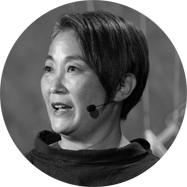 Tracy Fullerton, M.F.A. is an experimental game designer, professor and director emeritus of the USC Games program. Her research center, the Game Innovation Lab, has produced several influential independent games, including Cloud, flOw, Darfur is Dying, The Night Journey, with artist Bill Viola and Walden, a game, a simulation of Henry David Thoreau’s experiment at Walden Pond which was named “Game of the Year” at Games for Change 2017 and “Developer Choice” at IndieCade 2017. Tracy is the author of “Game Design Workshop: A Playcentric Approach to Creating Innovative Games,” a design textbook used at game programs worldwide, and holder of the Electronic Arts Endowed Chair in Interactive Entertainment.
Tracy Fullerton, M.F.A. is an experimental game designer, professor and director emeritus of the USC Games program. Her research center, the Game Innovation Lab, has produced several influential independent games, including Cloud, flOw, Darfur is Dying, The Night Journey, with artist Bill Viola and Walden, a game, a simulation of Henry David Thoreau’s experiment at Walden Pond which was named “Game of the Year” at Games for Change 2017 and “Developer Choice” at IndieCade 2017. Tracy is the author of “Game Design Workshop: A Playcentric Approach to Creating Innovative Games,” a design textbook used at game programs worldwide, and holder of the Electronic Arts Endowed Chair in Interactive Entertainment.
Prior to joining the USC faculty, she was president and founder of the interactive television game developer, Spiderdance, Inc. Spiderdance’s games included NBC’s Weakest Link, MTV’s webRIOT, The WB’s No Boundaries, History Channel’s History IQ, Sony Game Show Network’s Inquizition and TBS’s Cyber Bond. Before starting Spiderdance, Tracy was a founding member of the New York design firm R/GA Interactive. As a producer and creative director she created games and interactive products for clients including Sony, Intel, Microsoft, AdAge, Ticketmaster, Compaq, and Warner Bros. among many others. Notable projects include Sony’s Multiplayer Jeopardy! and Multiplayer Wheel of Fortune and MSN’s NetWits, the first multiplayer casual game. Additionally, Tracy was Creative Director at the interactive film studio Interfilm, where she wrote and co-directed the “cinematic game” Ride for Your Life, starring Adam West and Matthew Lillard. She began her career as a designer at Bob Abel’s company Synapse, where she worked on the interactive documentary Columbus: Encounter, Discovery and Beyond and other early interactive projects.
Tracy’s work has received numerous industry honors including an Emmy nomination for interactive television, best Family/Board Game from the Academy of Interactive Arts & Sciences, most “sublime experience,” the “Impact” and “Trailblazer” awards from the Indiecade Festival, ID Magazine’s Interactive Design Review, Communication Arts Interactive Design Annual, several New Media Invision awards, iMix Best of Show, the Digital Coast Innovation Award, IBC’s Nombre D’Or, Time Magazine’s Best of the Web and the Hollywood Reporter’s Women in Entertainment Power 100.
 TreaAndrea M. Russworm, Ph.D. is a Professor in the Interactive Media & Games Division at the University of Southern California. She is also the founder of Radical Play (a games-based public humanities initiative and afterschool program), and she has been a professor and Associate Dean of Diversity, Equity, and Inclusion at UMass Amherst.
TreaAndrea M. Russworm, Ph.D. is a Professor in the Interactive Media & Games Division at the University of Southern California. She is also the founder of Radical Play (a games-based public humanities initiative and afterschool program), and she has been a professor and Associate Dean of Diversity, Equity, and Inclusion at UMass Amherst. 
 Paolo Pedercini is a game developer, curator and educator. He teaches digital media and experimental game design at the School of Art at Carnegie Mellon University. Since 2003 he works under the project name “Molleindustria” creating provocative games addressing social justice, labor, and environmental issues.
Paolo Pedercini is a game developer, curator and educator. He teaches digital media and experimental game design at the School of Art at Carnegie Mellon University. Since 2003 he works under the project name “Molleindustria” creating provocative games addressing social justice, labor, and environmental issues. Gillian Smith is Director of the Interactive Media & Game Development program at Worcester Polytechnic Institute, which is one of the oldest academic games programs in the United States of America. She is an award-winning game designer whose scholarship focuses at the intersections of generative AI, game design, textile crafts, and social justice. In recent years, they have been developing and assessing new approaches to pedagogy for games and computer science, including fostering student metacognition through ungrading and project-based learning.
Gillian Smith is Director of the Interactive Media & Game Development program at Worcester Polytechnic Institute, which is one of the oldest academic games programs in the United States of America. She is an award-winning game designer whose scholarship focuses at the intersections of generative AI, game design, textile crafts, and social justice. In recent years, they have been developing and assessing new approaches to pedagogy for games and computer science, including fostering student metacognition through ungrading and project-based learning. Dr. Doris C. Rusch is a professor at Uppsala University, department of Game Design, with a focus on transformative play, and regenerative systems design. She is the author of “Making Deep Games”, numerous journal papers and book chapters on existential, transformative game design and deep game design processes, as well as lead designer of numerous award-winning games about the human experience, e.g. “Elude”, “Zombie Yoga”, “Soteria – Dreams as Currency” and “For the Records”. In her non-academic life, she is a certified coach with training in health coaching, strategic intervention, neuroscience for coaches and embodied transformation. She is the founder and custodian of The Hut, an organization dedicated to connecting people to their core values, each other and nature through body-based (somatic) strategies, intentional creativity, and the magic of play and symbolic action.
Dr. Doris C. Rusch is a professor at Uppsala University, department of Game Design, with a focus on transformative play, and regenerative systems design. She is the author of “Making Deep Games”, numerous journal papers and book chapters on existential, transformative game design and deep game design processes, as well as lead designer of numerous award-winning games about the human experience, e.g. “Elude”, “Zombie Yoga”, “Soteria – Dreams as Currency” and “For the Records”. In her non-academic life, she is a certified coach with training in health coaching, strategic intervention, neuroscience for coaches and embodied transformation. She is the founder and custodian of The Hut, an organization dedicated to connecting people to their core values, each other and nature through body-based (somatic) strategies, intentional creativity, and the magic of play and symbolic action. Dr Souvik Mukherjee is assistant professor in Cultural Studies at the Centre for Studies in Social Sciences Calcutta, India and a pioneering games studies scholar from the Indian Subcontinent. In his research spanning two decades, he looks at a diversity of topics starting with a poststructuralist reading of videogames as storytelling media, videogames as colonial and postcolonial media, videogame production studies in the Indian Subcontinent and currently, Indian boardgames and their colonial avatars. Souvik is the author of two monographs, Videogames and Storytelling: Reading Games and Playing Books (Palgrave Macmillan 2015) and Videogames and Postcolonialism: Empire Plays Back (Springer UK 2017), as well as many articles and book chapters in national and international publications. His upcoming book, Videogames in the Indian Subcontinent (Bloomsbury India) is in press, currently.
Dr Souvik Mukherjee is assistant professor in Cultural Studies at the Centre for Studies in Social Sciences Calcutta, India and a pioneering games studies scholar from the Indian Subcontinent. In his research spanning two decades, he looks at a diversity of topics starting with a poststructuralist reading of videogames as storytelling media, videogames as colonial and postcolonial media, videogame production studies in the Indian Subcontinent and currently, Indian boardgames and their colonial avatars. Souvik is the author of two monographs, Videogames and Storytelling: Reading Games and Playing Books (Palgrave Macmillan 2015) and Videogames and Postcolonialism: Empire Plays Back (Springer UK 2017), as well as many articles and book chapters in national and international publications. His upcoming book, Videogames in the Indian Subcontinent (Bloomsbury India) is in press, currently. Lisa Nakamura is Gwendolyn Calvert Baker Collegiate Professor of American Culture and the founding Director of the Digital Studies Institute at the University of Michigan, Ann Arbor. She is the author of several books on race, digital culture, and identity.
Lisa Nakamura is Gwendolyn Calvert Baker Collegiate Professor of American Culture and the founding Director of the Digital Studies Institute at the University of Michigan, Ann Arbor. She is the author of several books on race, digital culture, and identity. Soraya Murray is an interdisciplinary scholar of contemporary visual culture, with particular interest in film, art, and video games. Murray holds a Ph.D. in art history and visual studies from Cornell University, and an MFA in Studio Art from the University of California, Irvine. She is an Associate Professor in the Film + Digital Media Department at the University of California, Santa Cruz. Her writings have been widely anthologized nationally and internationally, and published in journals in the areas of contemporary art, film and digital culture. Murray’s book, On Video Games: The Visual Politics of Race, Gender and Space (I.B. Tauris, 2018, paperback 2021), considers video games from a visual culture perspective, and how they both mirror and are constitutive of larger societal fears, dreams, hopes and even complex struggles for recognition. Murray is currently co-editing an anthology with TreaAndrea Russworm on antiracist futures in games and play. She is also completing a book on contemporary cinema, difference, and the technological imaginary. Murray is a member of the critical/historical game studies journal ROMchip’s editorial group.
Soraya Murray is an interdisciplinary scholar of contemporary visual culture, with particular interest in film, art, and video games. Murray holds a Ph.D. in art history and visual studies from Cornell University, and an MFA in Studio Art from the University of California, Irvine. She is an Associate Professor in the Film + Digital Media Department at the University of California, Santa Cruz. Her writings have been widely anthologized nationally and internationally, and published in journals in the areas of contemporary art, film and digital culture. Murray’s book, On Video Games: The Visual Politics of Race, Gender and Space (I.B. Tauris, 2018, paperback 2021), considers video games from a visual culture perspective, and how they both mirror and are constitutive of larger societal fears, dreams, hopes and even complex struggles for recognition. Murray is currently co-editing an anthology with TreaAndrea Russworm on antiracist futures in games and play. She is also completing a book on contemporary cinema, difference, and the technological imaginary. Murray is a member of the critical/historical game studies journal ROMchip’s editorial group. Kishonna L. Gray is an Associate Professor in Writing, Rhetoric, & Digital Studies and Africana Studies at the University of Kentucky. She is an interdisciplinary, intersectional, digital media scholar whose areas of research include identity, performance and online environments, embodied deviance, cultural production, content creation, streaming, and Black Cyberfeminism.
Kishonna L. Gray is an Associate Professor in Writing, Rhetoric, & Digital Studies and Africana Studies at the University of Kentucky. She is an interdisciplinary, intersectional, digital media scholar whose areas of research include identity, performance and online environments, embodied deviance, cultural production, content creation, streaming, and Black Cyberfeminism. Emma Witkowski is a senior lecturer at RMIT University. She teaches game cultures, qualitative methods, and esports practices from a socio-phenomenological standpoint. Emma’s research explores high performance digital game worlds, and she has published widely on the intersections of these worlds and expertise, gender, media sports, embodiment, and the institutionalisation of esports in education, nonprofit and commercial sectors.
Emma Witkowski is a senior lecturer at RMIT University. She teaches game cultures, qualitative methods, and esports practices from a socio-phenomenological standpoint. Emma’s research explores high performance digital game worlds, and she has published widely on the intersections of these worlds and expertise, gender, media sports, embodiment, and the institutionalisation of esports in education, nonprofit and commercial sectors. Tracy Fullerton, M.F.A. is an experimental game designer, professor and director emeritus of the USC Games program. Her research center, the Game Innovation Lab, has produced several influential independent games, including Cloud, flOw, Darfur is Dying, The Night Journey, with artist Bill Viola and Walden, a game, a simulation of Henry David Thoreau’s experiment at Walden Pond which was named “Game of the Year” at Games for Change 2017 and “Developer Choice” at IndieCade 2017. Tracy is the author of “Game Design Workshop: A Playcentric Approach to Creating Innovative Games,” a design textbook used at game programs worldwide, and holder of the Electronic Arts Endowed Chair in Interactive Entertainment.
Tracy Fullerton, M.F.A. is an experimental game designer, professor and director emeritus of the USC Games program. Her research center, the Game Innovation Lab, has produced several influential independent games, including Cloud, flOw, Darfur is Dying, The Night Journey, with artist Bill Viola and Walden, a game, a simulation of Henry David Thoreau’s experiment at Walden Pond which was named “Game of the Year” at Games for Change 2017 and “Developer Choice” at IndieCade 2017. Tracy is the author of “Game Design Workshop: A Playcentric Approach to Creating Innovative Games,” a design textbook used at game programs worldwide, and holder of the Electronic Arts Endowed Chair in Interactive Entertainment.